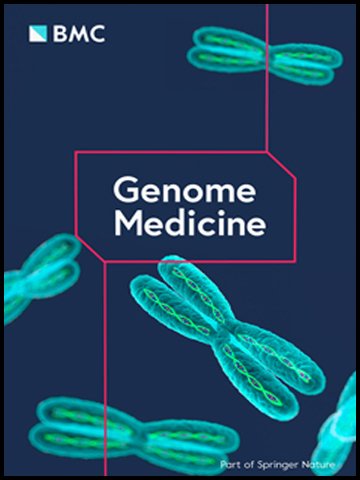单细胞系追踪揭示三阴性乳腺癌抗 EGFR 治疗耐药性的克隆动态变化
IF 10.4
1区 生物学
Q1 GENETICS & HEREDITY
引用次数: 0
摘要
大多数原发性三阴性乳腺癌(TNBC)表现为表皮生长因子受体(EGFR)基因扩增,导致蛋白表达增加。然而,与其他表皮生长因子受体驱动的癌症不同,在 TNBC 中靶向该受体会产生不一致的治疗反应。为了阐明这种不一致性的内在机制,我们采用细胞条形码和单细胞转录组学重建了表皮生长因子受体扩增的 TNBC 细胞对阿法替尼(一种不可逆抑制表皮生长因子受体的酪氨酸激酶抑制剂 (TKI))的亚克隆动态反应。综合谱系追踪分析显示,一种罕见的细胞亚群具有独特的生物学特征,包括胰岛素样生长因子结合蛋白2(IGFBP2)的表达水平升高。我们的研究表明,IGFBP2的过表达足以通过激活代偿性胰岛素样生长因子I受体(IGF1-R)信号通路使TNBC细胞耐受阿法替尼治疗。最后,基于重建的耐药机制,我们采用深度学习技术预测 TNBC 细胞对阿法替尼的敏感性。事实证明,我们的策略能有效重构驱动表皮生长因子受体靶向治疗耐药的复杂信号网络,为 TNBC 的个体化治疗策略的开发提供新的见解。本文章由计算机程序翻译,如有差异,请以英文原文为准。
Single cell lineage tracing reveals clonal dynamics of anti-EGFR therapy resistance in triple negative breast cancer
Most primary Triple Negative Breast Cancers (TNBCs) show amplification of the Epidermal Growth Factor Receptor (EGFR) gene, leading to increased protein expression. However, unlike other EGFR-driven cancers, targeting this receptor in TNBC yields inconsistent therapeutic responses. To elucidate the underlying mechanisms of this variability, we employ cellular barcoding and single-cell transcriptomics to reconstruct the subclonal dynamics of EGFR-amplified TNBC cells in response to afatinib, a tyrosine kinase inhibitor (TKI) that irreversibly inhibits EGFR. Integrated lineage tracing analysis revealed a rare pre-existing subpopulation of cells with distinct biological signature, including elevated expression levels of Insulin-Like Growth Factor Binding Protein 2 (IGFBP2). We show that IGFBP2 overexpression is sufficient to render TNBC cells tolerant to afatinib treatment by activating the compensatory insulin-like growth factor I receptor (IGF1-R) signalling pathway. Finally, based on reconstructed mechanisms of resistance, we employ deep learning techniques to predict the afatinib sensitivity of TNBC cells. Our strategy proved effective in reconstructing the complex signalling network driving EGFR-targeted therapy resistance, offering new insights for the development of individualized treatment strategies in TNBC.
求助全文
通过发布文献求助,成功后即可免费获取论文全文。
去求助
来源期刊

Genome Medicine
GENETICS & HEREDITY-
CiteScore
20.80
自引率
0.80%
发文量
128
审稿时长
6-12 weeks
期刊介绍:
Genome Medicine is an open access journal that publishes outstanding research applying genetics, genomics, and multi-omics to understand, diagnose, and treat disease. Bridging basic science and clinical research, it covers areas such as cancer genomics, immuno-oncology, immunogenomics, infectious disease, microbiome, neurogenomics, systems medicine, clinical genomics, gene therapies, precision medicine, and clinical trials. The journal publishes original research, methods, software, and reviews to serve authors and promote broad interest and importance in the field.
 求助内容:
求助内容: 应助结果提醒方式:
应助结果提醒方式:


